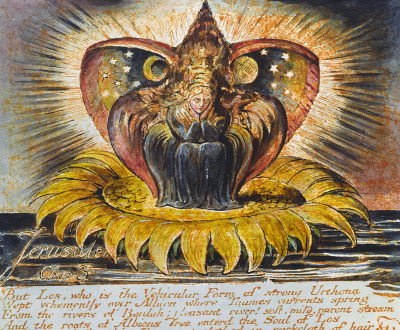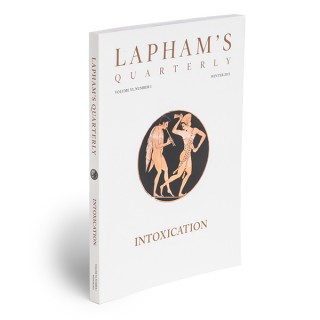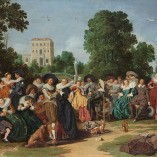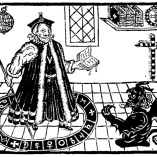
Jerusalem, The Emanation of the Great Albion, by William Blake, c. 1820. Wikimedia Commons.
“So what is a drug?” asks scholar-essayist Justin Smith-Ruiu in this week’s episode of The World in Time. “It’s a dry good that is transported and then sold in a particular measurable unit, and until you have those units of measurement and standardization for the purposes of commercial exchange, you don’t really have drugs. Of course, you have ayahuasca and fly agaric and whatever else, and you have people, at least going back to the Paleolithic, consuming these. But you don’t have the system of commodities that makes drugs a particularly modern phenomenon. And what happens as they are commodified—which you could also describe in the same way as saying what happens as they are transformed into drugs, as ayahuasca, for example, is transformed into a drug—is that they’re pulled out of the cultural and ritual context in which they had once made sense, and turned into intoxicants, turned into substances, the purpose of which is to remove you from the burdens of your life.”
This week on the podcast, Donovan Hohn revisits the topics of Intoxication (Winter 2012) and Disaster (Spring 2016), speaking first with Justin Smith-Ruiu, author of the forthcoming book On Drugs: Psychedelics, Philosophy, and the Nature of Reality, about the history of drugs and the history of California; about trips, long and strange, good and bad; and about Smith-Ruiu’s experiments—in philosophy and literary nonfiction as well as in psychopharmacology. Later in the episode, Hohn speaks with poet Rachel Richardson about California on fire; about the ways technology gives us a distorted, fishbowl view of disasters, natural and otherwise; about the documentary poetics of C.D. Wright; and about the classical Greek poetic form of the cento, two contemporary examples of which Richardson shares from her new collection, Smother.
WORKS CITED
[In order of mention.]
Justin Smith-Ruiu. On Drugs: Psychedelics, Philosophy, and the Nature of Reality. New York: W. W. Norton, 2025.
Rachel Richardson. Smother. New York: W.W. Norton, 2025.
C.D. Wright. One Big Self: An Investigation. Port Townsend, WA: Copper Canyon Press, 2007.
Justin Smith-Ruiu. The Internet is Not What You Think It Is: A History, A Philosophy, A Warning. Princeton, NJ: Princeton University Press, 2023.
Edmund Husserl. The Crisis of European Sciences and Transcendental Phenomenology: An Introduction to Phenomenological Philosophy. Translated by David Carr. Evanston, IL: Northwestern University Press, 1970.
Martin Heidegger. The Basic Problems of Phenomenology. Translated and introduced by Albert Hofstadter. Bloomington, IN: Indiana University Press, 1988.
Lewis H. Lapham. “Alms for Oblivion,” Lapham’s Quarterly, Winter 2012: Intoxication.
John Locke. An Essay Concerning Human Understanding. Edited by Tom Griffth. Notated by Mark G. Spencer. Ware, England: Wordsworth Editions, 2014.
Ian Hacking. The Social Construction of What?. Cambridge, MA.: Harvard University Press, 2000.
David Hume. A Treatise of Human Nature. Mineola, NY: Dover Publications, 2003.
Benjamin Breen. The Age of Intoxication: Origins of the Global Drug Trade. Philadelphia: University of Pennsylvania Press, 2021.
Ben Tarnoff. The Bohemians: Mark Twain and the San Francisco Writers Who Reinvented American Literature. New York: Penguin, 2015.
Josiah Royce. California: A Study of American Character. Berkeley, CA.: Heyday Books, 2002.
Joan Didion. “Notes of a Native Daughter.” In Slouching Toward Bethlehem. New York: Farrar, Straus and Giroux, 2008.
Herman Melville. Moby-Dick: A Norton Critical Edition. Edited by Hershel Parker. New York: W.W. Norton, 2017.
Terence McKenna and Dennis McKenna. The Invisible Landscape: Mind, Hallucinogens, and the I Ching. New York: Harper, 1994.
Vladimir Nabokov. Speak, Memory: An Autobiography Revisited. New York: Vintage, 1989.
Immanuel Kant. Critique of the Power of Judgment. Edited by Paul Guyer and Eric Matthews. Cambridge: Cambridge University Press, 2001.
William James. The Principles of Psychology, Volume One. Mineola, NY: Dover Publications, 1950.
Derek Parfit. Reasons and Persons. Oxford: Oxford University Press, 1986.
Lewis H. Lapham. “’Round Midnight,” Lapham’s Quarterly, Fall 2017: Music.
Boethius. Fundamentals of Music. New Haven: Yale University Press, 1989.
Rachel Richardson. Hundred-Year Wave. Pittsburgh: Carnegie Mellon University Press, 2016.
Lewis H. Lapham. “Shock and Awe,” Lapham’s Quarterly, Spring 2016: Disaster.
Saeed Jones. “The Blue Dress.” In Prelude to a Bruise. Minneapolis, MN: Coffee House Press, 2014.
Dorianne Laux. “Mother’s Day.” In The Book of Men. New York: W.W. Norton, 2011.
Louise Glück. “Mother and Child.” In The Seven Ages. New York: Ecco, 2002.
Sharon Olds. “The Human.” In The Unswept Room. New York: Knopf, 2002.
Lucille Clifton. “My Mama moved among the days.” In The Collected Poems of Lucille Clifton. Rochester, NY: BOA Editions, 2012.
Marianne Moore. “The Fish.” In The Complete Poems of Marianne Moore. New York: Penguin Classics, 1994.
Robert Frost. “The Road Not Taken.” In Robert Frost: Collected Poems, Prose, & Plays. New York: Library of America, 1995.






